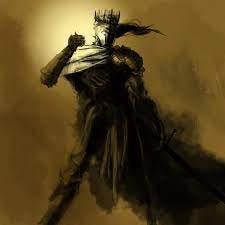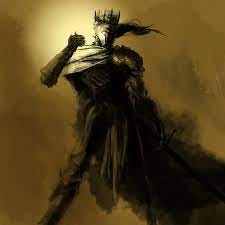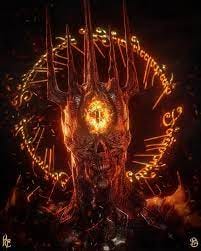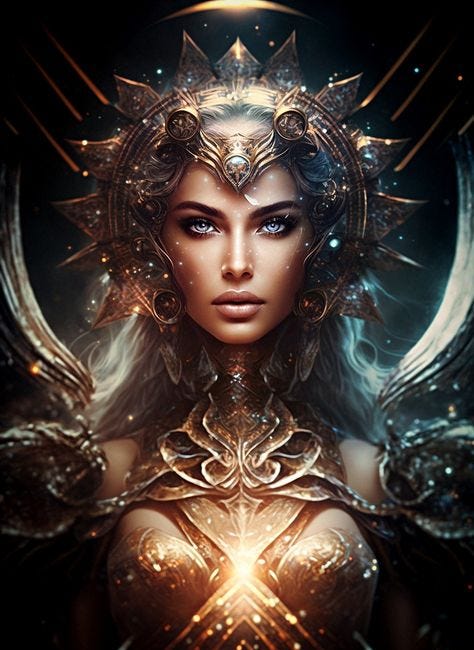The Importance of Bad Guys Doing Bad Things - Fiction Guide How to Never Fail at Writing - Why You Should Have your Villains do Truly Horrible Things
The Importance of Villainy
This essay was born out of something I’ve noticed of late about recent authors.
That something is that they don’t seem to be aware of how to introduce their villains. They don’t know how to fill them with a certain presence. Utterly unfamiliar with the concept of Evil they just don’t know how to instill this concept in people’s minds or to even imbue a sense of it into their characters.
This is especially true on tv as screenwriters evidently rely upon AI to do the majority of their work, and otherwise show themselves to be talentless losers. But this demands the question; why don’t Indie authors know how? A great many obviously do, but others don’t.
Early on when you first start writing, you probably already have either the hero or the villain in mind. It’s not something that is exactly surprising yet it is something that happens kind of instinctively for us writers. I get it, and this is something that’s one of the most beautiful things about being a writer.
It might sound strange but I kind of love hearing authors brag about their heroes and villains more than anything else in the world (just after their worlds). It is honestly something that is among the most thrilling experiences out there.
But one thing that never fails is that writers always have in mind some of the worst crimes and sins that this villain might perform. At least the Indie writers are like this; they tend to get so very excited that they can’t keep still (I’ve thought about a specialized podcast for just introducing our villains and heroes, calling it Villain Hour and Hero Hour respectively, let me know your thoughts in the comments!).
I’ve some experience also in hearing some I’ve met up with from College or High School occasionally saying ‘I don’t have any villains, you see they aren’t truly evil’ and stuff like that. This is misunderstanding the villain entirely.
Now when I say villain I don’t mean Antagonist. There’s a clear difference between them as the trouble is that the latter can be good, and is a much more neutral term. The former though is a much more clearly evil foe for the heroic lead to overcome.
The trouble with not having a villain in many narratives is that it shows the author is indecisive about the nature of their hero. Because what is a hero without a villain? If the villain isn’t evil, what does that make the hero? Clearly these people haven’t thought it through.
The thing about villains is that you need them in your narrative to help push the story along. They are present so that they might prod the hero along and challenge them, they are as necessary to the narrative as the love interest, the friends and the tools the hero uses along the way to challenge the villain.
While a villain shouldn’t ever outshine or outclass a hero in terms of grandeur they should nonetheless be present, and ought to be introduced in a manner that leaves them memorable and explains by showing rather than telling the readers why they must be stopped.
Think of every great narrative and you’ll see that the villain usually introduced him or herself in a manner that shows off how dastardly he or she could be.
Their Moment Under the Moon
What this means is that where the Hero must have their moment in the Sun, the Villain must have the opposite. It isn’t enough that they score some sort of victory along the way against the hero.
The villain MUST absolutely have one major moment where they commit an absolutely Evil Act. I emphasize this fact and must repeat it: The villain MUST absolutely have one major moment where they commit an absolutely Evil Act.
I repeat this fact only because there are a large number of people (imbeciles) who believe that each and every villain must be redeemed. This is a preposterous notion. The reason it’s preposterous is that there must be villains of incredible evil and depravity and that’s because if we don’t know Evil we can’t know what’s Good. How can we possibly pass down good values via stories if we’re unable to define what’s Good.
Naturally the Villains who are ‘complicated’ are less complex, and typically bore people to tears. Villains ought to be villainous and wicked, and while you can add some flavouring to them, generally if you want to achieve the greatest effect with your rogue it is by granting that he be allowed to go wild at least once.
Why do people remember Darth Maul? Was it because he was redeemable? Of course not, it’s because he was monstrous, evil and looked on everyone with hatred and murdered Qui-Gon Jinn before he was killed by Obi-Wan Kenobi.
Why do people remember Sauron? Because he forged the One Ring, used Celebrimbor as a battle-standard and attempted to enslave the whole of Middle-Earth.
Why do people remember each of their tales, or all the classic Disney movies? Because of the villains. They weren’t made ‘sympathetic’ (whatever that word even means at this point in time).
The fact of the matter is that a villain MUST do something despicable to to horrify the audience or the readers, they must undertake to attempt to shock, traumatize or break the hero. They are the antithetical force that opposes them, they aren’t there to be their ‘buddies’.
Take the video-game of Tales of Symphonia for example. The villain is semi-sympathetic but what wipes out all sympathy for him is because of how childish he is, and how he attempts to destroy the gentle Collette’s soul, seeks to break her all while also stealing Genis’ soul at one point and even attempting to turn Lloyd (the lead of the game)’s friends against him. He ravages the hometown of Presea, and corrupts everything that Kratos, Yuan and Martel ever built and dreamed of… why? Because it must fit within his vision of the world.
Take a more well known example; Palpatine doesn’t just let Anakin go, he corrupts him and utterly transforms him into a monster. He leaves Anakin awash in blood, this after he helped to arrange the death of the youth’s mother, and later in Ep 6 attempts to put father against son and seeks to claim the victor as his apprentice.
Joker isn’t Batman’s buddy, but the man who murdered his son, he’s a sick man that Batman genuinely wants to defeat (all that rubbish about him needing the Joker is rubbish, because if true it means Batman is Evil himself).
The fact of the matter is that Villains are the force of Evil in a story. They must seek to undermine what the hero does.
Jason Voorhees is the villain of F13. Throughout his movies he usually murders a couple of teens and adults before the final heroine or hero in Jarvis’ case rallies and seeks to defeat him.
Darth Vader helps destroy Alderaan.
Saruman imprisons Gandalf. The Witch-King wounds Frodo and helps to kill countless people.
Haman Kahn in Zeta Gundam enslaves Mineva Zabi the rightful heiress of Zeon.
Xaltotun slaughters thousands that he might reverse time and resurrect the capital city of Acheron.
You see where this is going? This must be borne in mind when writing a Villain.
Their first appearance on the set should be followed by a shocking act of villainy. It cements their status. Certainly you might have times where you delay the scene until later (which is fine) but the important thing is that it does eventually happen.
Naturally you shouldn’t over-exaggerate the crime or nature of the crime, but instead show the effect it has on the hero, and the effect should be monumental. It should fundamentally change his outlook on his situation.
Darth Vader kills Ben Kenobi, for example. This is a great one. This permanently fixes into your mind the reality of war and of tragedy.
A character death is a good way for example, whether tertiary in nature or secondary. Captain Antilles is an extra and the whole of the people of Alderaan are likewise unimportant but it is the scale of his atrocity that is horrifying. In turn though the death of Ben is deeply personal.
So that Star Wars as with the Greek Myths for example provide us with a useful blueprint.
I mention the Greek Myths because the best example is that of Herakles who must grapple with his stepmother’s cruelty. So what happens? She sends down madness that causes him to kill his family. Now we know he would never ordinarily do such a thing, so the crime is more Hera’s and yet he must bear the consequences of her Evil.
How to Do it?
This is a million dollar question, for which there’s no real clear cut answers. The most direct way I’d say is that one should have a minor crime at the start of the story. This should be connected to the villain’s introduction.
But the Crime can vary on how clearly criminal or sinful it is. What do I mean by this? It depends on the Archetype.
All Villains are shadow-Archetypes, with the Shadow-Warrior liable to outright murder someone close to the lead. Tyrants (Shadow-King) Archetypes will usually dispatch someone to do his dirty work, so that he doesn’t directly involve himself in the life or needs of the hero. The Shadow-Lover Archetype will seek to trick or deceive him and otherwise mislead him (if this sounds like something a trickster would do, it is because it is). The Shadow-Magician will lie and deceive and mislead also, though he might arrange for the death of another whilst aping at being a mentor of the hero.
You see each of them seeks to harm the lead in their own way. The Lover will cheat, deceive and gamble, and needle the hero for his personal foibles and otherwise betray him sexually. A good example of a Shadow-Lover Archetype is Kitiara Uth Matar from Dragonlance who betrays and manipulates Tanis Half-Elven throughout the Chronicles Trilogy.
An Evil Mentor/Magician Archetype is the likes of Sinestro in a way from the Green Lantern First Flight movie, in which he enchants, he persuades and otherwise presents himself to everyone as a reasonable sort only to reveal himself not as a charming Caesarian figure, but a mad, monster desperate to establish his Communist styled rule over the universe.
You see the first great Evil acts they perform are each of them minor at the start, then later far more major later so that there’s something of an ‘unsmaking’ of sorts. This often happens, but the good writer knows to plant evidence along the way so that Readers might see it coming.
Now the ability by some to imagine an ‘evil’ act is pretty stunted as all know. There are those who think ‘disagree with me politically’ to be Evil (you know who they are), and the trouble with such authors is that their works usually come off as childish. It isn’t how Evil should be presented.
If you need a good idea of how Evil works, you can read any number of classical stories such as that of Herakles (notably what others do to him), the Volsungs Saga, the Nordic Myths (specifically Loki’s various nefarious acts), Zeus’ many rapes, the Bible (look into what the successors of David did, some of it is pretty nasty such as the Moloch sacrifices).
Also you can look to history such as that of the Aztecs, of the Conquista of Spain, the sacking of a number of cities, the Mongol conquests or say the Harrowing of the North of England or the 100 Years War from 1297-1450 (Look up what Edward I did to the Scots, Edward the Black Prince did in Spain and France or Henry V with his prisoners of war).
Now just as you should look into these various crimes, these various evil acts you should also look into heroic acts as a counter-balance to know how your heroes should balance themselves out against the villains.
Look into the life of Henry IV (damn heroic guy), Jehanne D’Arc, the likes of Jan Sobieski, the Reconquista, the Acts of the Apostles from the Bible, the story of Herakles, Odysseus, Sigmundr, and so on.
So reading is the key to discovering great villains, and how to write them. Their motivation should come from something simple such as ‘I want the One Ring’ or along the lines of ‘I want to conquer the Kingdoms of Hyboria and reforge them in my image’ and so on.
Each villain has their own methodology, their own wants and you must make it clear to the Readers just WHY they are the villain. The reason must be made clear to everyone, because the thing about us Readers is that we can’t read your mind, especially not through a book or a screen.
We might well try, but we can’t. So you have to write your villains in such a manner that their villainy is plain to see, they are simple in nature and prone to cruelty in some manner or fashion that differentiates them from the heroes.
Speaking of a good villain with a nice here’s a story that starts with one; Olympnomachi.
The First Book of the Olympnomachi: Table of Contents
This series of tales begin long before the Age of Steel of the likes of Seonag, and Sigrún and thousands of years before the rise of Roma, and that of Kemet and Deshret before it.
**********
The yearly Subscription will be kept down to a mere 7$.
Also Crown of Blood has a new edition, with maps, character bios and more!







I think a Villain and/or Hero hour is a great idea.
I'm voting for the Villain and Hero hour too! I agree totally about needing a strong villain. Morally grey villains can ruin a story, unless the purpose is to explore that morality and not to entertain. At least I consider that an exception. Of course, I prefer to be entertained when I read and not forced to think or make moral judgements!
In my writing, I have to pull back from the evil in my villains though. I find it fairly easy to create something that does terrible things just because it's evil. The Demeid in my fantasy serial is just that. An evil force looking to corrupt and ultimately destroy the world.
In my other stories, I like to give my villain a motive. They do evil things (murdering millions of people without a second thought? Yup. Torturing children? Yup. Enslaving an entire population? Yup.), but they believe it is the right thing to do. They either have a different moral compass or they are themselves depraved. I hope readers will find them believable (not a caricature) and also be screaming at them about how wrong they are. Or watching in horror as they do the terrible things. But I'll admit I don't know if that's the right approach, or if I'm finding the right balance for the villainy. Again, I want to entertain, leave an impression, and not make the reader think too much.